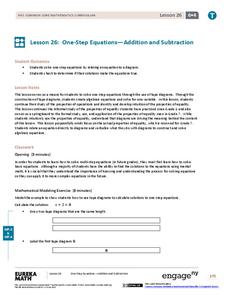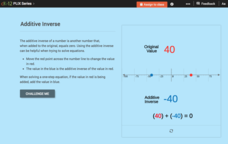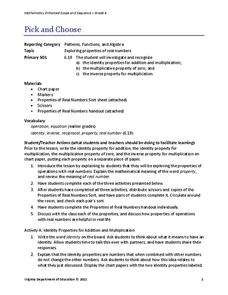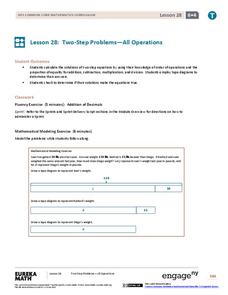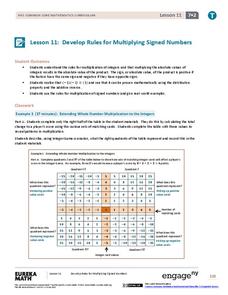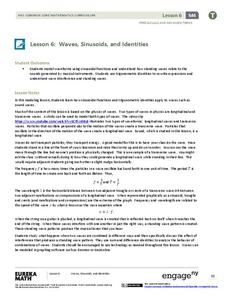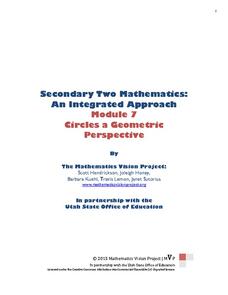Willow Tree
Number Properties
The number of basic algebraic properties can become overwhelming for learners. A lesson plan explains and gives examples for all the basic algebraic properties. The resource is perfect to use as a way for pupils to...
EngageNY
Matrix Multiplication and Addition
To commute or not to commute, that is the question. The 26th segment in a 32-segment lesson focuses on the effect of performing one transformation after another one. The pupils develop the procedure in order to multiply two 2 X 2...
EngageNY
One-Step Equations—Addition and Subtraction
Just one step is all you need to find success in solving equations. The 27th installment in a series of 36 teaches how to solve one-step equations involving addition and subtraction. Tape diagrams help future mathematicians in this task.
CK-12 Foundation
One-Step Equations and Inverse Operations: Additive Inverse
Reinforce properties while solving equations. Learners often ignore properties even as they try to apply them. A well-designed lesson emphasizes the role of additive inverses when solving equations.
Virginia Department of Education
Pick and Choose
Properly teach properties with three activities that allow learners to investigate properties of real numbers. The resource covers the identity properties for addition and multiplication, the inverse property for multiplication, and the...
EngageNY
Writing Addition and Subtraction Expressions
Symbols make everything so much more concise. Young mathematicians learn to write addition and subtraction expressions — including those involving variables — from verbal phrases. Bar models help them understand the concept.
Scholastic
Study Jams! Multiplication
What does baking cupcakes have to do with multiplication? Watch this video and find out as your class learns that multiplication is the repeated addition of equal groups. Properties of multiplication are also introduced with...
EngageNY
Two-Step Problems—All Operations
Step 1: Use the resource. Step 2: Watch your class become experts in solving two-step problems. Scholars learn to solve two-step word problems in context. They use tape diagrams and algebraic techniques to break the problem into two,...
Curated OER
Properties of Equality
What assumptions are made in order to solve equations? An instructional slideshow provides an overview and guided examples of how properties of equality can be used to justify each step in solving equations.
Virginia Department of Education
Properties
Examine some properties that don't require a general contractor. Scholars first complete a mental math activity that uses the properties of real numbers. A separate activity formalizes these properties.
EngageNY
Replacing Letters with Numbers II
Teach about properties properly. Individuals investigate the commutative and identity properties for both addition and multiplication. They see that the properties hold true for all values by using substitution to test out several examples.
EngageNY
The Distributive Property and the Products of Decimals
Make multiplication of decimals easier by applying the distributive property. Pupils investigate how they can use the distributive property to multiply decimals. After learning the strategy, they work on some practice problems at...
EngageNY
Addition and Subtraction Formulas 1
Show budding mathematicans how to find the sine of pi over 12. The third instructional activity in a series of 16 introduces the addition and subtraction formulas for trigonometric functions. Class members derive the formulas using...
Homeschool Creations
Skip Counting
Young mathematicians hop, skip, and jump their way to a deeper number sense with the help of these printable handouts.
Virginia Department of Education
A Mystery to Solve
Investigate field properties of real numbers. Scholars use a table for a given operation to determine the identity element. They use the same table to find a missing value in an equation.
EngageNY
Develop Rules for Multiplying Signed Numbers
Investigate the case of two negatives making a positive. Pupils fill in a quadrant system to generate the products of integers. They analyze the quadrants to find patterns and relationships to help complete the table values. The teacher...
EngageNY
Solving a Linear Equation
Solving an equation is the art of creating simpler equivalent equations using properties of equality. Here, classes see that solving an equation is not always as easy as guessing. The lesson presents linear equations that scholars must...
EngageNY
Waves, Sinusoids, and Identities
What is the net effect when two waves interfere with each other? The lesson plan answers this question by helping the class visualize waves through graphing. Pupils graph individual waves and determine the effect of the interference...
Willow Tree
Solving Inequalities
What does solving an inequality have in common with solving an equation? Almost everything! A math resource focuses on the one exception. The examples lead learners through the steps of solving an equality when multiplying or...
CK-12 Foundation
Vector Subtraction
Move vectors to determine their difference. Pupils use an interactive to visualize the opposite of a vector. They use the concept of adding vectors to subtract vectors by adding the opposite and, finally, view the differences of the...
Mathematics Vision Project
Circles: A Geometric Perspective
Circles are the foundation of many geometric concepts and extensions - a point that is thoroughly driven home in this extensive unit. Fundamental properties of circles are investigated (including sector area, angle measure, and...
EngageNY
Relationships Between Quantities and Reasoning with Equations and Their Graphs
Graphing all kinds of situations in one and two variables is the focus of this detailed unit of daily lessons, teaching notes, and assessments. Learners start with piece-wise functions and work their way through setting up and solving...
West Contra Costa Unified School District
Multiplying Binomials and Factoring Trinomials
Two lessons for the price of one! Learners use algebra tiles to multiply binomials in the first lesson, Next, they use their knowledge from the first lesson to factor trinomials into two binomials.
US Environmental Protection Agency
Aquifer in a Cup
Young scientists create their very own aquifers in this science lesson on ground water. After learning about how some people get their drinking water from underground wells, young learners use sand, modeling clay, and aquarium rocks to...


